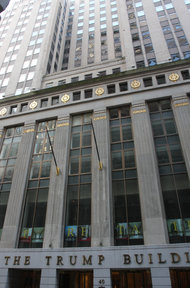 Tina Fineberg for The New York TimesThe China Investment Federation opened a New York office in the Trump Building at 40 Wall St.
Tina Fineberg for The New York TimesThe China Investment Federation opened a New York office in the Trump Building at 40 Wall St.
Shaolin-style martial arts. A plate-spinning acrobat. Musicians playing the dizi, a Chinese bamboo flute, and the yangqin, a hammered dulcimer.
That was the scene Thursday evening on the 52nd floor of the Trump Building at 40 Wall St. in Lower Manhattan, where the China Investment Federation, a new organization supporting Sino-American deal-making, celebrated the opening of its New York office.
The group, which started last summer in Beijing, aims to help Chinese investors overcome cultural, political and logistical hurdles to doing business in the United States. Sponsored by DKI Capital, a Beijing-based investment firm, the China Investment Federation now has a toehold in the symbolic center of American capitalism.
“We hope this office will be a place for the Chinese millionaire in New York,” Chris Li, the president of DKI, said in a speech on Thursday, comparing the opening of the office to the establishment of the New York Stock Exchange.
With the rise of China as a global power, investors there are looking for opportunities overseas. Increasingly, Chinese and American firms are doing business together, and United States investors are raising more money to do deals in China.
The importance of China to Wall Street underpinned the decision by Stephen A. Schwarzman, head of the Blackstone Group, to create a $300 million scholarship for study in the country.
Still, it can be challenging to navigate the differences between the two countries. Chinese investors are increasingly opting to buy stakes in overseas companies rather than buy them outright, in the face of political opposition, said Dajiang Guo, the chief executive of Citic Securities International USA.
“That’s a business reality we all need to face,” he said at the event on Thursday.
Part of the mission of the China Investment Federation is to bridge these disparate markets. Unlike the United States, China lacks “stratification of capital,” said Jay Riskind, managing director for global projects at DKI Capital. Investments there are “opportunistic,” he said.
“As we plant the flag on Wall Street, we consider this a meaningful moment for realizing the Chinese dream,” Mr. Riskind said.
Thursday’s event attracted a crowd from finance, law and real estate, who took in Chinese-style performances in the office space while enjoying cocktails and hors d’oeuvres. Waiters passed around trays of tea-smoked chicken on wonton crisps with saffron aioli; shredded Peking duck on scallion pancakes with plum hoisin sauce and julienne cucumbers; and filet of beef on rosemary dusted potato with white bean puree.
Richard Huang, secretary general of the China General Chamber of Commerce, was in attendance, as was Khalid Malik, director of the human development report office of the United Nations.
“I’m just stopping by,” said Jeff Huang, managing director for greater China at the IntercontinentalExchange. “I have a dinner appointment on Wall Street.”
The leader of the China Investment Federation, Yang Shengli, has a lavishly appointed office that was open for guests to explore, featuring tables made from Chinese redwood. The furniture, with a combined value estimated at more than $200,000, was shipped from China.
For symbolism, it seemed the China Investment Federation couldn’t do much better than an office on Wall Street inside a building named after the master of showmanship, Donald J. Trump.
“The whole Trump family is very excited to have them in the building,” said Steve Lafiosca, Mr. Trump’s director of commercial properties.
Article source: http://dealbook.nytimes.com/2013/05/17/a-toehold-for-china-on-wall-street/?partner=rss&emc=rss
